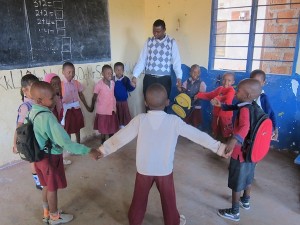April is Volunteer Appreciation Month! Here at AVC, we spend a lot of time telling you about what the Volunteers are up to, but we want to take this opportunity to explain exactly why we do what we do.
AVC is built on the principle that Africans working to solve African issues can create positive, locally appropriate, and sustainable change. Historically, the international aid system has implemented foreign development projects in Africa from the top down and has had little success creating lasting, positive change. Solutions to development challenges must be informed by local knowledge in order to take root and really grow, but foreign aid often sidesteps local participation, hindering Africans’ right to decide the paths to progress within their own communities.
Meanwhile, local development organizations are run by people who have identified issues in their own communities and are working to solve them. Local people have plenty of ideas for ways to address the issues facing their communities, but organizations often lack the financial resources or skills to manage and fundraise for their projects in an effective way.
Local people can create they change they seek if they have the opportunity to learn from hands-on experience and put their passion and knowledge to use. By working for an entire year on locally initiated development projects, AVC Volunteers are able to learn new skills, improve their abilities as community leaders, and gain the experience they need to get the jobs they want or start their own projects in the future.
Just as importantly, the Volunteers are able to serve grassroots organizations that really benefit from their help. By working in areas such as microfinance, early childhood education, advocacy for women and children, and support services for people living with HIV/AIDS, the Volunteers bring their skills and passion directly to the people who need it most and help their host organizations in countless ways.
Volunteer Saad Urassa started a poultry-rearing project to pay for teachers’ salaries at his organization, UWAWAYAKI, which provides education to vulnerable children and health services to individuals living with HIV/AIDS. Saad’s project has allowed UWAWAYAKI to retain the staff they need to serve the people who rely on them. Another Volunteer, Rasheed Makamba, taught computer classes which helped his adult students, some of whom were single mothers with minimal formal education, secure jobs they otherwise would not have been able to get. In Mwanza, Deogratias Mamiro secured a grant of 40,000,000 TSH (25,000 USD) that allowed his organization to start providing microloans, giving small businesses throughout the community the chance to get off the ground.
The relationship between the Volunteers, their host organizations, and the communities they serve, is profoundly beneficial. Volunteers gain hands-on experience and improve their skills, becoming confident and capable professionals and leaders. Organizations have extra assistance in the form of passionate and qualified Volunteers. And communities benefit from the increased impact of the local organizations that serve them. AVC Volunteers work for the experience they want while simultaneously lifting up their communities, creating a cycle of learning and service. Multiplied across the continent, this model could create massive change, taking the lid off of African potential.


